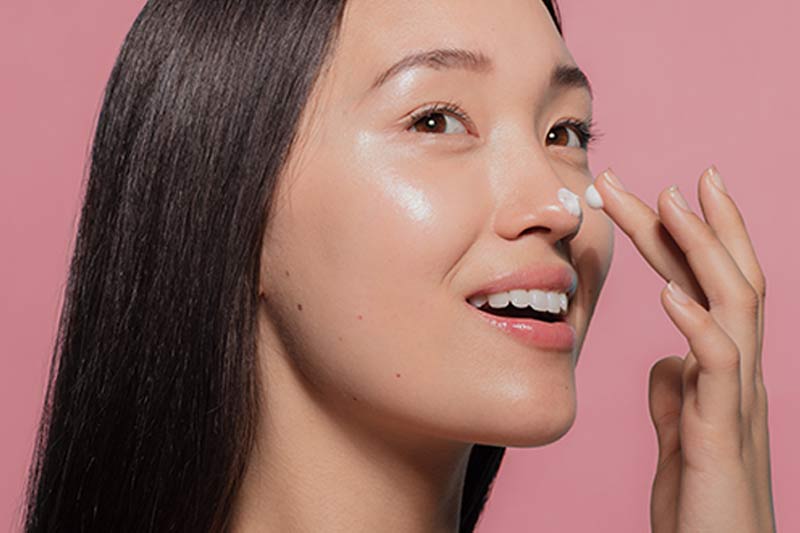The quality and effectiveness of a skincare product largely depend on its formulation and the use of active ingredients – compounds with proven beneficial effects. Retinol and hyaluronic acid shine among active ingredients as the staples of anti-aging skin care.
This article compares retinol and hyaluronic acid, helping you determine which ingredient is better for your needs.

Retinol vs. Hyaluronic Acid: Overview
Retinol and hyaluronic acid are two of the most potent skincare ingredients. This table provides an overview of their differences, uses, and benefits.
| Retinol | Hyaluronic Acid (HA) | |
|---|---|---|
| What is it? | A form of vitamin A. | A sugar compound in our tissues. |
| Can the body produce it naturally? | No. | Yes. |
| Sources | Food (fish, eggs, dairy, some plants), supplements, topical skincare products, medications. | Bone broth, supplements, topical skincare products, dermal fillers, medications. |
| Use cases | In cosmetics: skin repair and rejuvenation. In medicine: vitamin A deficiency. | In cosmetics: hydration In medicine: helps with joint disorders, asthma, eye and dental surgeries, soft tissue augmentation, bladder problems. |
| When can you start using it? | For aging signs: mid-20s. For acne: teenage years. For medical reasons: when the doctor advises. | At any age. |
| How often can you use it? | Topical use: once or twice a week in the beginning; every night or every other night when the skin gets used to it. Other uses: per medical provider’s advice. | Topical use: In the morning and evening daily. Other uses: per medical provider’s advice. |
| Skin benefits | Decreased appearance of aging signs, improved skin tone. | Increased hydration, improved aging signs. |
| Risks and Side Effects | Redness, irritation, dry skin, flakiness. | No side effects with topical hyaluronic acid. HA dermal fillers may cause swelling and redness. |
What Is Retinol?
Retinol is a form of vitamin A typically found in animal-derived foods. Our bodies can also make retinol from beta-carotene in plant-based foods, such as carrots, sweet potatoes, spinach, kale, etc.
Retinol is essential for overall health, especially vision, immune function, tissue growth and development, and skin health.
Research has shown that topically applied retinol can stimulate the production collagen, the skin-building protein responsible for firmness and elasticity. Retinol also increases cell turnover – shedding dead skin cells and generating new ones. Increased collagen production and improved cell turnover help repair damaged skin and decrease aging signs, such as wrinkles and hyperpigmentation.
Note: Learn when aging starts and how to delay the appearance of more pronounced signs.
What Is Hyaluronic Acid?
Hyaluronic acid is a sugar compound naturally produced in our connective, neural, and epithelial tissues, including the skin. Its primary function is to lubricate the joints and ligaments, help heal wounds, and hydrate the skin to improve its barrier function.
Hyaluronic acid has an exceptional ability to attract and retain moisture from the air and deeper skin layers. It can bind water molecules up to 1000 times its molecular weight, making it one of the most powerful humectants in skin care. Its hydrating effects are immediate and help to increase the skin’s suppleness.
Note: Find more tips and products to get rid of dry skin.
Sources of Retinol and Hyaluronic Acid
While hyaluronic acid is naturally produced in our bodies, our primary source of vitamin A is food. However, HA production wanes with aging, and food-based retinol isn’t enough to sustain a youthful complexion, so we turn to human-made products for these skin essentials.
Retinol
Retinol is the most abundant in animal products – fish, dairy, eggs, and liver. People who want to rejuvenate their skin use skincare products with retinol, most often retinol serums and creams. Dermatologists often prescribe retinol-based creams and medications to teenagers with acne. Retinol supplements are effective for people deficient in vitamin A.
Hyaluronic Acid
Hyaluronic acid is the star ingredient in many skincare products, including cleansers, hydrators, serums, creams, and facial masks. It is also the primary ingredient in one of the most popular cosmetic treatments: dermal fillers. They help augment the lips, plump up the lower face that has lost elasticity, and conceal acne scars.
Hyaluronic acid supplements can also help with skin and overall health, but we highly recommend consulting a medical provider before starting any new supplement regimen.
Retinol vs. Hyaluronic Acid Use Cases

Retinol and hyaluronic acid are common skincare ingredients with different uses.
Retinol
Retinol is primarily used to repair skin damage caused by aging, sun exposure, smoking, inflammation, and other factors. It exfoliates the skin, repairs skin cells and epidermis, and builds a tighter, smoother complexion.
Hyaluronic Acid
Hyaluronic acid increases skin moisture, improving concerns related to dry skin: loss of elasticity, wrinkles, redness, and dull skin. In medical settings, hyaluronic acid is given to relieve joint pain, dry eyes, vaginal dryness, bladder problems, respiratory issues, and to help heal wounds.
When Can You Start Using Retinol and Hyaluronic Acid?
People respond differently to retinol and hyaluronic acid, so skin experts advise different ways to introduce them into your skincare routine.
Retinol
Retinol is an ingredient that potentially causes irritation. Since its main purpose is to repair aging-related skin damage, cosmetic professionals advise people not to use it before the first aging signs appear in their mid-20s or early 30s.
Hyaluronic Acid
As a natural compound in our bodies, hyaluronic acid is safe for all ages. Some baby creams are formulated with HA.
Hyaluronic acid dermal fillers are more invasive treatments and are only approved for adults. Like retinol products, skin experts don’t recommend HA injections until the first signs of aging appear.
How Often Can You Use Retinol and Hyaluronic Acid?
For safe and effective results, use retinol and hyaluronic acid products according to instructions on the product labels or as prescribed by your medical provider.
Retinol
Retinol products are introduced gradually into a skincare routine because they may cause irritation. Users are advised to apply retinol once or twice weekly for several weeks before increasing the frequency to every night or every other night.
Hyaluronic Acid
Hyaluronic acid is safe to use daily. Skin experts recommend using a hyaluronic acid cream as the final step in your night skincare routine and just before applying an SPF in the morning.
Benefits of Retinol and Hyaluronic Acid
Retinol and hyaluronic acid have a similar purpose: to strengthen and rejuvenate the skin. They achieve this to varying degrees, depending on their concentration, other ingredients in the skincare product, and the patient’s unique skin concerns.
Retinol
Reported benefits of retinol include decreased appearance of fine lines and wrinkles, brighter skin, and improved skin tone.
Hyaluronic Acid
The effects of using topical products with hyaluronic acid include plumper, more supple, and glowing skin. HA fillers can volumize the lips, contour the cheeks, lift sagging jowls, and smooth nasolabial folds.
Retinol vs. Hyaluronic Acid Risks and Side Effects
Topical use of retinol and hyaluronic acid typically doesn’t pose any serious risks. However, retinol is a harsher ingredient than HA and may cause more side effects.
Retinol
Some patients experience dry skin, itchiness, redness, and flakiness after using retinol creams and serums. The side effects are more common when retinol is used during the day because it increases the skin’s sensitivity to the sun. Skin experts advise people to use retinol at night and apply SPF the following morning.
Note: Learn why sunscreen is a skincare essential and should be used daily.
Hyaluronic Acid
Hyaluronic acid in topical products is not known to cause any side effects. HA dermal fillers may cause swelling, redness, itching, and pain at the injection site.
Is It Better to Use Retinol or Hyaluronic Acid?
Retinol and HA products both aim to rejuvenate the skin. However, their benefits are slightly different, and their effectiveness depends on various factors, including the patient’s skin. People with sensitive skin may experience irritation with retinol use, while people with more pronounced aging signs may not notice an improvement using only HA creams.
Consult your cosmetic provider to find the best skincare routine for you.
Can Hyaluronic Acid and Retinol Be Used Together?
Many people combine retinol and hyaluronic acid products or use one product with both ingredients. Combined, hyaluronic acid and retinol don’t negate each other’s effects but only improve them, because hyaluronic acid mitigates the drying effects of retinol.
Conclusion
In the vast sea of cosmetic products, users universally recognize hyaluronic acid and retinol as ingredients that really make a difference. They affect the skin differently, but the result is frequently the same – a more vibrant, refreshed complexion.
To achieve the best results, look for products that combine these two superstar ingredients and use them consistently.


